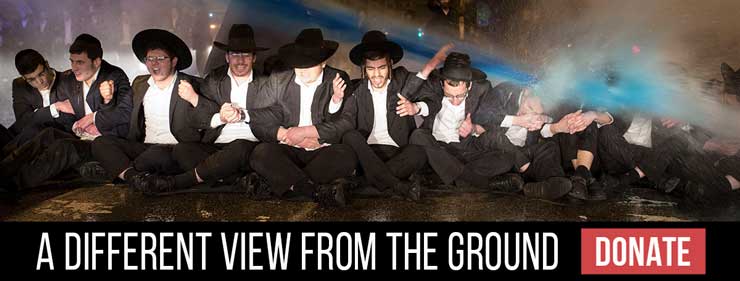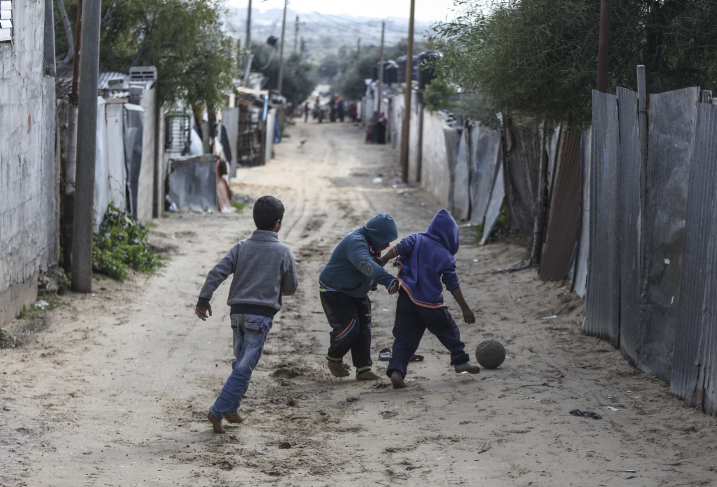From Palestinian refugees to High Court justices, the Jewish Nation-State law will have a significant impact on several groups affected by the Israeli-Palestinian conflict. This is what we can do about it.
By Said Zeedani

The Jewish Nation-State Law, a new law with the force of a constitutional amendment, enshrined Israel as the exclusive nation-state of the Jewish people, demoted the official status of the Arabic language, and gave the right of self-determination in Israel to Jews alone. Palestinian political leaders, Israeli opposition politicians, and dovish Jewish-American groups all lambasted the passage of the law earlier this year, with some saying the law amounted to apartheid and promoting Jewish supremacy.
But beyond the headlines, the Jewish Nation-State Law, sends worrying messages to five different, though interrelated, groups.
The first group is comprised of Palestinian refugees of 1948, whether they reside inside or outside the boundaries of historic Palestine. The law is telling them that their return in large numbers to the villages and towns from which they were uprooted in 1948 is out of the question, since that will disturb the demographic balance of the Jewish State.
In other words, Jews should remain the decisive majority of the citizens of the State of Israel for the long term, just as Israel should remain their exclusive nation state. In addition, and as Prime Minister Netanyahu tweeted recently, even the reunification of Palestinian families divided by the Green Line will become extremely difficult due to the passage of this basic law.
The second group is comprised of Palestinian citizens of Israel. The law tells them that they have no national or collective rights within Israel. The law tells them that they only have individual and not group rights, both in the civil and political realms. The right to national self-determination in Israel is exclusive to Jews, and, hence, it does not apply to them. The law is telling Palestinian citizens of Israel not to even dare dream of separation, to transform Israel into a bi-national state, and not to entertain ideas or visions about autonomy.

Finally, the law is telling Palestinian citizens of Israel that they have no significant role in matters affecting the Jewish character of the state and how that affects issues such as security, borders, demography, language, the national anthem, or national holidays and symbols. In short, Israel is what it is, and should remain what it is: the state of the Jews. Jews are the masters of the house and they are the only ones with a say regarding sovereignty.
The third group is comprised of the Jews who live outside of Israel. To them, the law says: the State of Israel is your nation state, so you must maintain and protect it, just as it must maintain and protect you. It is your refuge, and it is yours, just as it is for its Jewish citizens. Jews have no other nation state except Israel, the law tells them, and they have the right to immigrate to it at any time.
Strangely, while Jews living outside of Israel, citizens of other countries, can call Israel their nation state, the law denies the very same right to Palestinians living within Israel’s borders and who hold Israeli citizenship.
The fourth group to whom the law speaks is all those who advocate for a democratic one-state solution for Palestinians and Israeli Jews. To them, it says: there is no place for one democratic state in which both Palestinians and Israeli Jews can enjoy equal rights — not in a bi-national, federal, or liberal democratic state. Equal rights is anathema to the Zionist movement, and more specifically, to the idea that the State of Israel is the nation state of the Jews, whether inside or outside its borders.
The fifth group is comprised of Israel’s High Court of Justice and its exponents, including liberal Israeli political parties and politicians, intellectuals, and jurists. To them, it says: Israel’s Jewish character takes a clear precedence over its democracy. Accordingly, there is no room for attempts to strike a balance between the Jewish and the democratic components. The former, according to the Jewish Nation-State Law, takes priority over the latter. This means that Israel is a democracy only to the extent that is consistent with its Jewishness. Needless to say, the Jewish Nation-State Law, a basic law, is binding on the justices of the High Court as well as judges of lower courts.

Since Israel’s founding, the Knesset has passed countless laws that sent identical messages to the aforementioned groups. So why is the Jewish Nation-State Law different? The new law gives explicit legitimacy to the discriminatory laws, practices, and policies that have passed since 1948. Meanwhile, it is also forward-looking, creating a new legal reality with far reaching implications for Palestinians both inside and outside Israel’s borders. This will grant legitimacy to similar, perhaps more alarming, policies, regulations, and practices.
What can be done?
It goes without saying that a serious struggle should be conducted to abolish this ominous law, which undermines the basic principle of equal democratic citizenship. It will need to take place both locally and internationally; it should be waged by civil society, in the legal system, and legislatively. There are many Israeli Jews, as well as many proponents of democracy and human rights worldwide, who are potential partners in such a struggle.
But the struggle must also acknowledge that Israel’s regime of racial superiority and discrimination, created in and sustained since 1948, will not end with the abolishment of the Jewish Nation-State Law. Thus, the struggle must target all laws and policies that sustain an edifice of supremacy. The ultimate goal must be to give the democratic component in the normative definition of the State of Israel a clear and explicit precedence over the Jewish component. In parallel, it must aim to reduce the power of the Jewish component, and offset what remains of it with some sort of autonomy for the Palestinians in Israel, which is needed in any case to preserve their distinct ethnic/national identity.
Dr. Said Zeedani is an associate professor of philosophy at Al-Quds University.

